- Details
- Written by: Kamran Mofid
- Hits: 4297
A Heart-felt Message to the World's Leaders gathered in New York on 25-27 September 2015: Why the Common Good Matters- Why Values Matter
“It’s all a question of story,” wrote Thomas Berry. “We are in trouble now because we do not have a good story .. . . and the old story, the account of how we fit into it, is no longer effective. We have not yet learned the new story.”
But it shouldn’t be that way. We can begin to see a better world; and for sure, we can begin to inspire others to see it too.
But again, we need a different story to tell. Not the continuous story of the need for more “Economic Revolution”, but the story of our need for a “Spiritual Revolution”. A story rooted in human needs and dignity; taking action, leading to a sweeping transformation of global economic and political systems to deal with the threats of uncontrolled migration, poverty and injustice, as well as climate change and environmental degradation, amongst others.
I wish, with the utmost humility to offer you “my story” for your kind consideration.
"Already a billion of us go to bed hungry every night. Not because there isn't enough, but because of the deep injustice in the way the system works."-OXFAM International
In the year 2000, the world leaders adopted the Millennium Declaration: A commitment to a peaceful, prosperous, and just world. The declaration included a set of targets for development and poverty reduction to be reached by 2015. These came to be known as the Millennium Development Goals (MDGs).
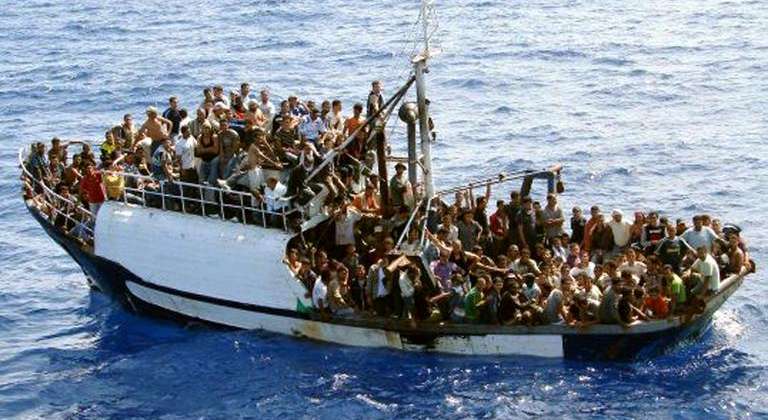
Refugees making their way to Europe
Photo: cdn.i24news.tv
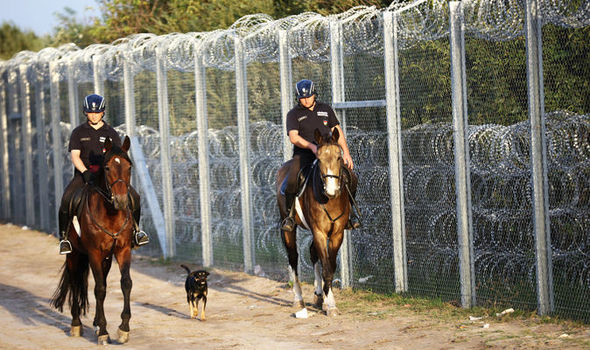
Hungarian police officers patrol the new razor wire fence
Photo: AFP. GETTY
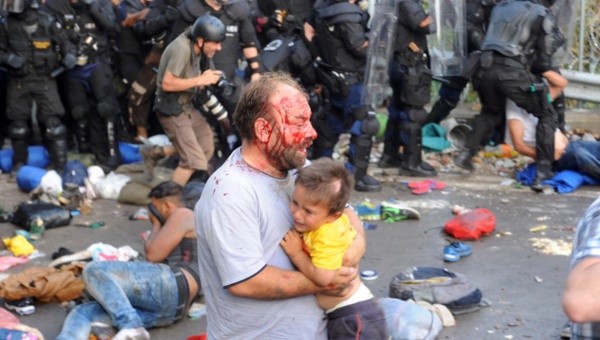
An injured migrant carries a child during clashes with Hungarian riot police at the border crossing with Serbia in Roszke, Hungary. Hungarian riot police used tear gas against crowds of refugees and migrants packed with children and the elderly. | Photo: Reuters
The World leaders are arriving in New York to approve the U.N’s new socio economic agenda for the next 15 years: Sustainable Development Goals (SDGs) targeted to be achieved by 2030.
For sure, there will be no question, the gathering in New York will be a regular jamboree, a spin doctor arranged forum, with the usual nice words and promises. There will be mutual backslapping about the progress that has been made over the past 15 years, since the MDGs were adopted. They will solemnly pledge to meet the 17 sustainable development goals, with 169 specific targets, by 2030. They will turn a blind eye to what is happening in Serbia, Hungary, Croatia, and the rest of Europe, where some countries have put up razor wires to keep the unwanted, untouchables out: A far cry from the year 2000, when the world leaders adopted the Millennium Declaration: A commitment to a peaceful, prosperous, and just world!
- Details
- Written by: Kamran Mofid
- Hits: 8839
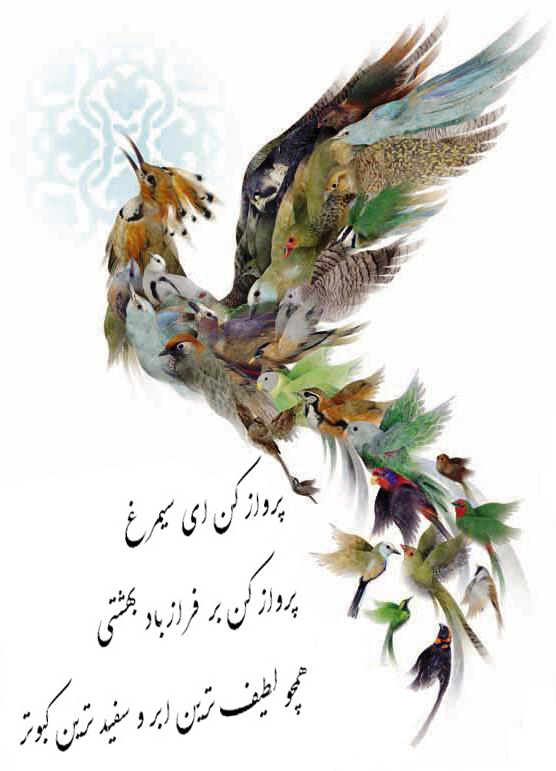
Simorgh: Thirty Birds
‘In the famous epic Persian poem "Conference of the Birds," the birds of the world gather to decide who is to be their king. The hoopoe, the wisest of them all, suggests that they should find the legendary Simorgh, a mythical Persian bird. The hoopoe leads the birds, each of whom represent a human fault which prevents man from attaining enlightenment. When the group of thirty birds finally reach the dwelling place of the Simorgh, all they find is a lake in which they see their own reflection. They realize that they were the Simorgh (which in Persian literally means "thirty birds") all along. The leader they sought was each and every one of them.’
‘Hundreds of birds embark on a perilous journey across seven treacherous valleys in search of a king who can right the wrongs in their world. They are led by the poet Attar, who has been transformed into a sharp-beaked, crested hoopoe. The troubles that spur them into flight — "Anarchy — discontent — upheaval! Desperate fights over territory, water, and food! Poisoned air! Unhappiness!" — are of course all too familiar in our world.’
As I continue to further and deepen my research on “Values-led Leadership and the Common Good” I came across the story of Simorgh as depicted in Farid ud-Din Attar’s famous 12th century epic poem, The Conference of the Birds (منطقالطیر).
I believe Attar’s classic Persian story can teach us a lot about the principles of vision, participation, values-led and collective leadership we must embody in order to build a better and more harmonious world.
- Details
- Written by: Kamran Mofid
- Hits: 3765
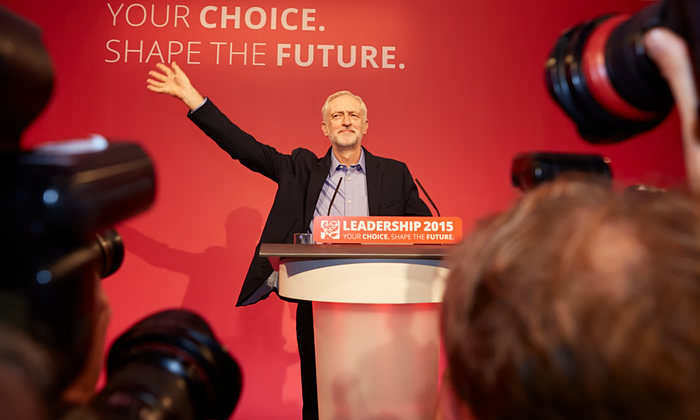
Jeremy Corbyn
Photo: guardian.co.uk
On Saturday 12 September 2016 Jeremy Corbyn was elected leader of the British Labour party, in a stunning first-round victory that dwarfed even the mandate for Tony Blair in 1994.
He won with nearly 59.5% of first-preference votes, beating rivals Andy Burnham, who trailed on 19%, and Yvette Cooper who received 17%. The “Blairite” candidate Liz Kendall came last on 4.5%.
As it has been noted by many observers writing about and analysing Mr. Corbyn’s election, including Gary Younge in today's Guardian: “Whatever one thinks of the wisdom of that choice, the transformational nature of it is beyond question. It has revived debates about nationalisation, nuclear deterrence and wealth redistribution and returned the basis of internal Labour party divisions to politics rather than personality. It has energised the alienated and alienated the establishment. The rebels are now the leaders; those who once urged loyalty are now in rebellion. Four months after losing an election, a significant section of Labour’s base is excited about politics for the first time in almost a generation while another is in despair.”
And now let me share with you why I, too, am excited and pleased with the result of this Labour leadership election.
Yes. I am pleased. As now for the first time in decades, we will have an alternative to neo-liberalism when we go to vote. This is great. Many people have become apathetic, disillusioned with politics since Labour became a copy of the Tories, albeit, pretending to be a bit nicer, a bit less austere and less painful!
Democracy, the neo-liberals tell us, is all about choice, the ability to choose amongst competing alternatives.
Now, with the election of Jeremy Corbyn we will have that choice, we will be able to exercise our democratic rite to choose amongst competing alternatives when we go in a ballot box next time around.
I hope Jeremy Corbyn and his team will carry on encouraging the British people and indeed the people everywhere to imagine that a better world, a better life is possible: A World that can be for the Common Good- when we begin to contribute our energies and our insights to our always-emerging common good.
OURS IS THE RIGHT AND THE POWER TO IMAGINE A NEW COUNTRY
In the country I wish to see, we value ourselves, and we value each other. In this new country, it is an honour to serve, where the highest good is the common good.
We must begin to imagine what the world for the common good may look like:
Imagine a political system that puts the public first. Imagine the economy and markets serving people rather than the other way round. Imagine us placing values of respect, fairness, interdependence, and mutuality at the heart of our economy. Imagine an economy that gives everyone their fair share, at least an appropriate living wage, and no zero-hour contracts. Imagine where jobs are accessible and fulfilling, producing useful things rather than games of speculation and casino capitalism. Imagine where wages support lives rather than an ever expanding chasm between the top 1% and the rest. Imagine a society capable of supporting everyone’s needs, and which says no to greed. Imagine unrestricted access to an excellent education, healthcare, housing and social services. Imagine hunger being eliminated, no more food banks and soup kitchens. Imagine each person having a place he/she can call home. Imagine all senior citizens living a dignified and secure life. Imagine all the youth leading their lives with ever-present hope for a better world. Imagine a planet protected from the threat of climate change now and for the generations to come. Imagine no more wars, but dialogue, conversation and non-violent resolution of conflicts.
This is the country and the world I wish to see and I believe we have the means to build it, if we take action in the interest of the common good.
Today our country, despite many good works, deeds and actions by so many individuals, organisations, civil societies and more, is facing a number of major socio-economic, political, ecological, moral, ethical and spiritual crises. We see all around us rising levels of abject poverty, inequality and austerity, food banks and crisis centres, housing, education, welfare and healthcare crises, challenges facing children, young people and senior citizens and the prospect of a climate crisis, to name but a few.
Today, in many parts of the world, including our own country, the so-called “free” market, the consumerist culture, and “Black Friday” sales, have become increasingly dominant, and are now seriously threatening our global future, both in terms of our care of the planet, ourselves and our neighbours, and in increasing societal rivalry and conflict.
Thus, no wonder that, in the process we have lost trust in everything: politics, economics, politicians, business, CEOs, governments, the media, and dare I say, even in mainstream religions. Time is of the essence. We must build cultures of trust, being prepared to take risks for the common good. We must begin today, with this election of a new Labour leadership.
Trust surely comes from the experience of a relationship - an in-depth experience - which by its nature is rooted in values that are not necessarily economic or monetary.
At the basis of such trust is an understanding that, in spite of our differences, we have our humanity in common. Archbishop Desmond Tutu speaks of “that African thing, Ubuntu” – the notion that a person is only a person through other persons. A person with “Ubuntu” is open and available to others, all others, for we are incomplete without each other. Ubuntu echoes the insight of John Donne that “No man is an island ..... I am involved in mankind.” What was true for John Donne in the 17th Century is even more so today.
Therefore, let us work in cooperation for the benefit of all - instead of competition that has been so deeply entrenched in our psyche - that has turned people against one another and has destroyed every ounce of our true spiritual essence that flows through our veins as living, breathing human beings.
Despite how sincere we might be, echoing Einstein, we cannot solve our problems with the same kind of thinking that created them - and neither can we solve our economic crisis by using the same tools that created the financial mayhem. We have to find a whole new system and a new way of thinking. A core essential truth, in which I firmly believe, is that a more hopeful story of change, based upon principles of the ‘common good’, is needed to address many of the big challenges confronting our country and world.
The practice of the common good is beginning to emerge as a transformative, inspirational and aspirational alternative way to approach our polarised socio-political/economic, spiritual and cultural existence. It is at the heart of a profound generational shift that has the potential to strengthen civil society and place human dignity at the heart of economic and political decision-making.
How can we become agents of change for the common good? How can we spark a new public conversation framed around human dignity and the common good?
In seeking to answer these and other relevant pertinent questions, and to understand the world better, we need to discover the world not just as it is, but also how it ought to be. Indeed, the deepest and most difficult questions with which we wrestle are problems of value — right and wrong, beautiful and ugly, just and unjust, worthy or unworthy, dignified or abhorrent, love or hatred, cooperation or competition, selflessness or selfishness, progress and poverty, profit and loss.
Human beings have explored these many questions of value through religion, philosophy, the creation of art and literature, and more. Indeed, questions of value have inaugurated many disciplines within the humanities and continue to drive them today. Questions and conversations about values and valuing are fundamental to what it means to be human, but rarely become the subject of explicit public reflection.
In short, if we want to realise anything good in life, including any goals we may set for ourselves, we must begin, first and foremost, by focusing on some fundamental and enduring questions of human meaning and value. Questions such as:
1. What does it mean to be human?
2. What does it mean to live a life of meaning and purpose?
3. What does it mean to understand and appreciate the natural world?
4. What does it mean to forge a more just society for the common good?
By their very nature, these questions involve thought and discussion around spirituality, ethics, morals and values.
This means that our lives are connected not only to knowledge, power and money, but also to faith, love and wisdom. Unless the questions we ask encompass the full spectrum of these emotions and experiences, we are unlikely to find the answers we are looking for, or to understand them in any depth, let alone solving problems and attaining goals.
The current economic model - employed by all political parties who have governed our country since the late 1970s - has brought us a very bitter harvest. This bitter harvest is the result of the quintessential ignorance and narrowness of these models and their utter inability to accept that our life journey is not merely about economics, money and finance. We need to understand and acknowledge that our crises are not merely economic but, to an even greater degree, deeply spiritual.
This is why I firmly believe that we must begin by discussing values to highlight why they matter.
The benefits of the current economic/money globalisation are limited and are based on individualism, greed, self-interest and economics (regarding human societies primarily as economic systems in which financial considerations alone govern choices and decisions). Other fundamental values such as faith, spirituality, justice, love, compassion, sympathy, empathy, co-operation, co-creation, and the common good are neglected.
To answer the call for inclusion of moral, ethical and spiritual values in all we do, we in the Globalisation for the Common Good Initiative (GCGI) have developed a model of what it would look like to put values such as love, generosity, integrity, honesty, cooperation, friendship and caring for the common good into socio-political and economic practice, suggesting possibilities for healing and transforming our world.
To focus our minds, assisting us to see the big picture, I very much wish to offer for consideration and reflection the deeply held values of the GCGI.
I firmly believe that if these or similar ennobling values are adopted by ALL, and then are seriously adhered to in practice, then the attainment of our vision for a better world becomes much more possible indeed.
We value caring and kindness
We value passion and positive energy
We value service and volunteerism
We value simplicity and humility
We value trust, openness, and transparency
We value values-led education
We value harmony with nature
We value non-violent conflict resolution
We value interfaith, inter-civilisational and inter-generational dialogue
We value teamwork and collaboration
We value challenge and excellence
We value fun and play
We value curiosity and innovation
We value health and wellbeing
We value a sense of adventure
We value people, communities and cultures
We value friendship, cooperation and responsibility
The future is full of risk and perils for our planet and all peoples. If we are to survive we must surely build cultures of peace, justice, kindness, and trust, and we must walk together to face the future. The journey, for sure, will be much more secure and fruitful if we begin to walk the walk together for the common good.
As far back as the 6th century BC, the Greek poet Theognis of Megara said: “Hope is the one good god remaining.”
As the poet Theo Dorgan reminds us, hope is a profound act of imagination, the most important and the most neglected of the civic virtues. In the face of the present societal and global crises we can lie down in despair, or we can choose hope — which means placing all our faith in each other and in the boundless capacity of the imagination to reinvent circumstance, to establish new truths.
We are no mean people. We have hearts and minds, we care for each other still, we have our dreams — and in dreams, as the poet Delmore Schwartz once said, “in dreams begin responsibilities”. It falls to us, voting in May, to assume the responsibility of dreaming a new country.
I exhort you to imagine what we can achieve together if we allow such a vision of values to guide our choices when we vote next time.
Kamran Mofid,
Founder, Globalisation for the Common Good Initiative
www.gcgi.info
- September 1st is the day Japanese children are most likely to kill themselves
- World in Chaos and Despair: The Healing Power of the Simple Things in Life
- Sundays: Making them Special Again
- Unbridled capitalism is the 'dung of the devil'- Pope Francis
- Responsible Leadership in Action, Geneva, June 2015
